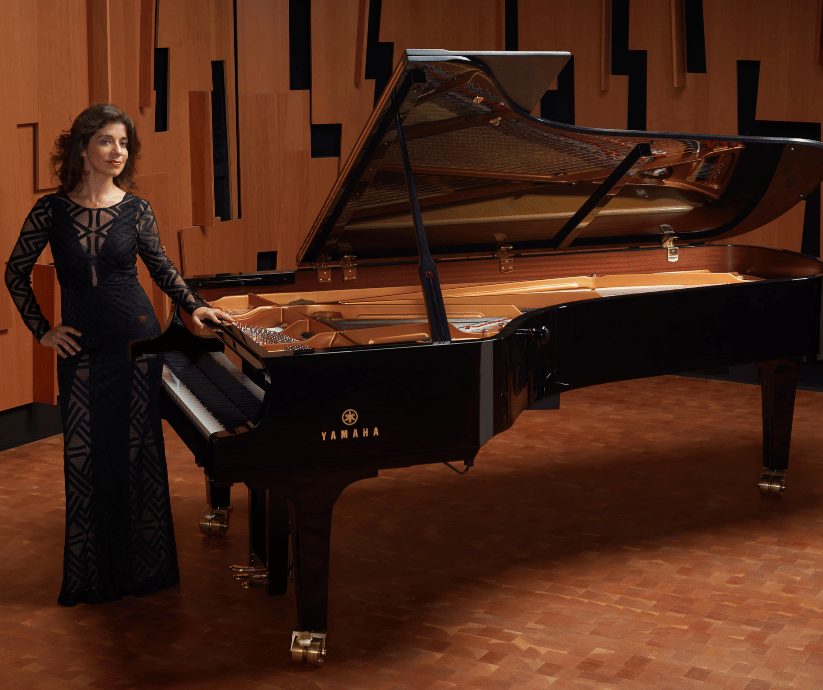Jewish pianist, composer, writer, and professor Inna Faliks continues to highlight themes of collaboration and unity in her artistic output.
Immigrating from antisemitic persecution and violence in the Soviet Union’s Ukraine to Chicago, Faliks was musically gifted from a young age, starting piano at the age of five and quickly performing as a soloist in prestigious concerts and competitions. Music was a big part of her family, and the culture of her hometown Odessa, she said. Often described as a child prodigy, Faliks had already written an opera by the age of nine, she said.
“My life was music from an early age, and I performed, trained, and did what it takes to become a performing artist. It took a lot of discipline,” she added.
Faliks has also always had a love for other artforms, and has sought ways to incorporate diverse artistic influences into her own work. If you’re a musician, you have to be familiar with other artforms, Faliks said. The piano is the most solitary of all instruments, so it’s really important to find ways to collaborate with other artists, she added. When forming interdisciplinary projects, Faliks describes her creative process as ‘inevitable’.
“Living in New York, I wanted to start something that would unify two art forms that I loved. And one of those art forms was of course music performance, and the other was poetry, which I’ve always been very inspired by. So I thought, what would happen if you cross-pollinate those two audiences, and make something that would be a seamless dialogue between poems and music?” Faliks said, referencing her project ‘Music Words’, an interdisciplinary live performance series featuring collaborations between musicians and poets in the form of live recitals and poetry readings.
Faliks also has a passion for writing, having published articles in publications like The Jewish Journal, Washington Post and Los Angeles Times. Most recently, she has published a book ‘ Weight in the Fingertips, A Musical Odyssey from Soviet Ukraine to the World Stage’, detailing her immigration from Soviet Union Ukraine to America alongside her artistic journey. To celebrate, On May 19, Faliks has a concert at The Broad Stage in Santa Monica with a program oriented around the memoir.
Faliks innovative spirit shone through in the pandemic, where she started her ‘Corona Fridays’ series, performing a live-streamed concert every Friday from her home. During the pandemic, she felt a need to continue performing and sharing music with people, which she feels didn’t have to stop because people were at home, Faliks said. She also employed an interdisciplinary approach to these concerts, having her children read poetry while she played, she added.
“Corona Fridays was a way for me to feel connected to myself as a performer and also keep myself in shape as a musician,” Faliks said.
As a Jewish musician, being a part of an ethnic and cultural identity, specifically the wave of immigrant Jews from the former Soviet Union, informs who she is as a person and as an artist, Faliks said. She added that being from the Soviet Union, where antisemitism was institutionalized, has given her the unique insight into recognizing antisemitism, especially after the terrorist attacks of October 7th, and has encouraged her to not be afraid to speak honestly and recognize what is true and historic. As a Jewish UCLA professor, she actively encourages her colleagues and students to not be afraid to speak out against antisemitism, Faliks said.
“Part of my new CD coming out is a piece called Voices, which was supported by the Lowell Milken Fund for American Jewish Music, and composed by Lev Zhurbin ‘Ljova’. Every movement of the piece uses historical recordings of Jewish music. The first movement, which I play the most, uses the voice of a cantor from Odessa who perished in the Warsaw Uprising, recorded from a 1907 Rosh Hashanah service – the piece is magical and incredibly moving. The second movement uses an anonymous klezmer clarinet recording, and the final movement uses a recording of a female cantor from New York in the 1940s. I think that this piece is especially meaningful and relevant now, and I’m very proud that it’s the centerpiece of my new recording,” Faliks said.
As a piano professor at UCLA, Faliks gets the opportunity to work with students one-on-one, which allows her the opportunity to truly get to know each one of them, she said. For an hour a week, she works with her students on piano playing and their musical journey, but she also gets the chance to learn about her students’ varying backgrounds, experiences and futures, she added, while also feeling like she has a chance to have a very direct impact on their lives. Her ‘studio’, which compromises the students at UCLA she teaches privately, feels almost like an extended family, Faliks said. She added that teaching and performing are almost like a yin and yang – two parts of the same hole. If she wasn’t teaching she wouldn’t be as good a performer, and vice versa, Faliks said, and as a teacher, she has the opportunity to share her experiences as she changes as a performer, which is a magical process.
“When you collaborate as an artist, you get to be mutually inspired, and see things in a different and fresh light. It’s always challenging, but when you find commonalities in your paths as artists, it’s always an extremely gratifying and natural process,” Faliks said.
–Image via https://www.innafaliks.com/

